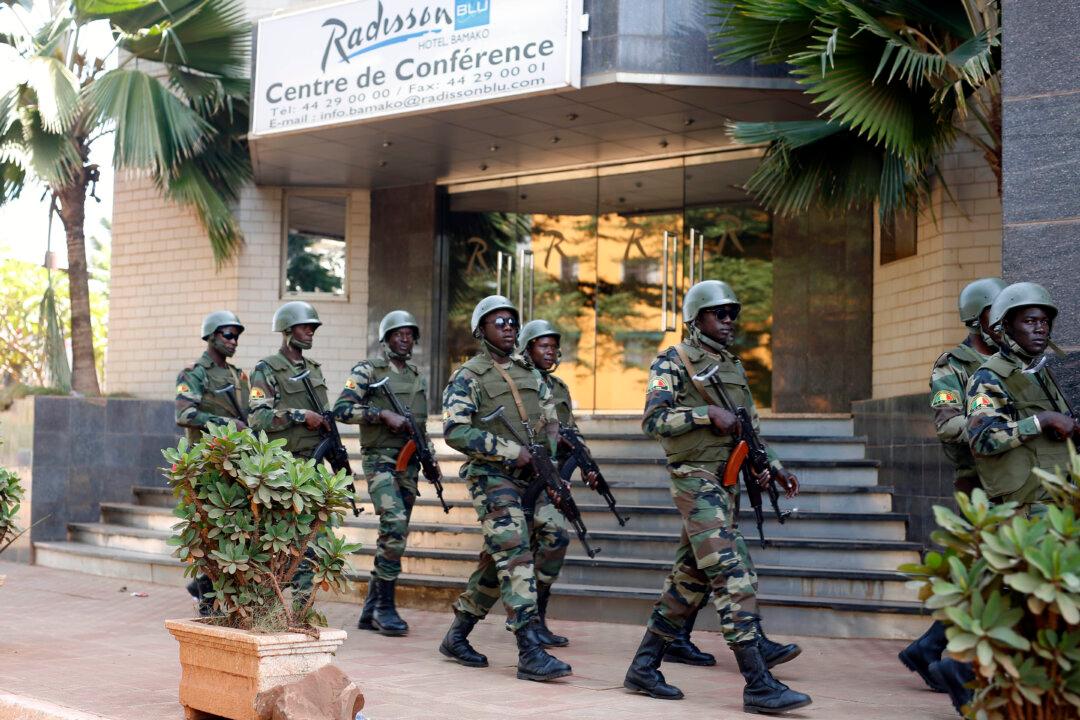BAMAKO, Mali—Malian security forces were hunting “more than three” suspects on Saturday after a brazen assault on the Radisson Blu hotel in the capital that killed 20 people, most of them guests, officials said.
Speaking to reporters briefly after visiting the scene, Mali President Ibrahim Boubacar Keita said the attack underscored the global threat posed by Islamic extremists, especially coming just one week after teams of attackers in Paris killed 130 people while targeting a stadium, a concert hall and cafes and restaurants.
“These people have attacked Paris and other places. Nowhere is excluded,” Keita said, adding that Mali would still remain open to the world. “Mali is not a closed area and it never will be.”
Malians awoke to a state of emergency after Friday’s attack in Bamako that was claimed by an extremist group formed by notorious Algerian militant Moktar Belmoktar. The statement from the Al-Mourabitoun (The Sentinels) group said the assault was in cooperation with al-Qaida’s “Sahara Emirate.”
“The search has started and I can tell you that we are looking for more than three people at the moment,” said Maj. Modibo Nama Traore, describing the hunt for suspects who may have been involved. Two of the attackers died in the assault.
On Friday morning, heavily armed assailants shouting “God is great!” in Arabic burst into the complex and opened fire on guards before seizing dozens of hostages at the hotel popular with foreigners, sparking a more than seven-hour siege by Malian troops backed by U.S. and French special forces.
The 20 dead included 18 hotel guests and two Malian gendarmes, Interior Minister Salif Traore said at a press conference Saturday, crediting the response of Malian forces for limiting the number of fatalities caused by gunmen who were “determined to die.”
“The quick intervention of the Malian forces allowed us to avoid the worst,” he said, adding that 17 guests were injured along with three police officers.
As the siege dragged on Friday, hostages trickled out slowly as security forces worked to secure the hotel floor by floor. At least one guest reported the attackers instructed him to recite verses from the Quran as proof of his Muslim faith before he was allowed to leave.
The hotel was being guarded by national police on Saturday, said Sgt. Idrissa Berthe, one of the officers posted at the scene which was still strewn with broken glass from shot out windows. “This morning, investigators have begun to arrive to do their work,” he said.
President Keita announced the 10-day nationwide state of emergency beginning at midnight. He said a three-day period of national mourning was due to begin Monday, with flags flying at half-mast.
Northern Mali has been unstable since it fell to Tuareg separatists and Islamic extremists following a military coup in 2012. Despite a French-led military intervention in 2013 that drove the extremists from cities and towns, attacks have continued and extended farther south this year, including an assault on a Bamako restaurant popular with foreigners in March.
The attack may have been motivated by a desire to disrupt a fragile local peace process that has made progress in recent months, Jean-Herve Jezequel, an analyst for the International Crisis Group, said in an interview posted to the group’s website Friday night.
Armed groups in the north signed a peace accord with the government in June and local agreements were signed in October, though radical groups have been excluded from the process.
In its condemnation of the attack, the 57-nation Organization of Islamic Cooperation linked the attack to the negotiations, saying its goal was to “destabilize Mali and destroy the peace process.”
At the same time, the attack could be directed at French military and other interests in Mali or an attempt by other militant groups to assert their presence after the deadly Nov. 13 Paris attacks claimed by the rival Islamic State (ISIS).
Djallil Lounnes, an expert on radical groups in the Sahara based in Morocco, said it was a way for al-Qaida to show it is still relevant.
“Al-Qaida and its international affiliates have been surpassed by ISIS and needed to show that that they are still there,” he said.
Even before the attack ended on Friday, some officials said it highlighted the need for tighter security measures and stricter surveillance.
“Our government needs to introduce stricter identification and information systems so that we can track everybody,” said lawmaker Amadou Thiam, a vice president of Mali’s parliament.
Belmoktar, an Algerian militant who has long been based in the Sahara, shot to prominence after his group carried out a January 2013 attack on an Algerian gas plant that resulted in the death of 39 foreign workers.
Many of his closest lieutenants were later killed by French forces in operations over the last two years and there were reports he himself was killed in June, though he has been reported dead several times.
The dead in the hotel attack included 41-year-old American development worker, six Russian plane crew from a cargo company, and three senior executives from the powerful state-owned China Railway Construction Corp., officials said.





